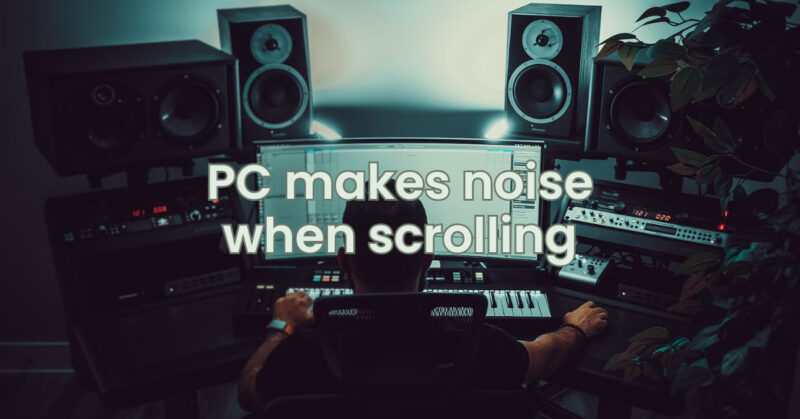Imagine this scenario: you’re engrossed in your digital tasks, scrolling through documents or websites on your computer. As you navigate with your mouse wheel, a strange noise suddenly emerges from your PC, interrupting the silence. What’s causing this unexpected auditory disturbance? In this article, we’re embarking on a journey to unravel the mystery of why your PC makes noise when scrolling. We’ll delve into the realms of technology and mechanics, exploring potential sources, underlying mechanisms, and solutions to ensure a more serene computing experience.
The Intersection of Technology and Acoustics
To understand the phenomenon of your PC making noise when scrolling, we need to bridge the gap between technology and acoustics. Computers are intricate machines powered by a symphony of electronic components working together. Scrolling, a seemingly simple action, involves a complex interplay between sensors, circuits, and mechanical parts.
Mechanical Noise: The Hidden Performer
The key culprit behind the noise your PC emits when scrolling lies in mechanical movement. While it’s easy to associate computers with electronic sounds, the reality is that mechanical components within your computer can produce sound as well. Here’s how it happens:
- Hard Drive Noise: Traditional hard drives with spinning disks can generate noise as they access data. When you scroll, the computer might be retrieving information from the hard drive, leading to audible vibrations and hums.
- Fans and Cooling Systems: PCs rely on fans to dissipate heat and maintain optimal performance. As you scroll, the increased processing activity can trigger fans to spin faster, generating noise as a side effect.
- Vibration and Resonance: The mechanical vibrations generated during scrolling can resonate through the various components of your PC, producing audible sounds in the process.
Identifying the Potential Causes
- Hard Drive Activity: If you hear a clicking or whirring sound while scrolling, it might indicate increased hard drive activity. Consider upgrading to a solid-state drive (SSD), which is quieter and faster compared to traditional hard drives.
- Fan Speed: Noisy fans could be a result of increased processing demands during scrolling. Cleaning or replacing fans, as well as optimizing your PC’s cooling setup, can mitigate fan-related noise.
- Vibration Dampening: If vibrations and resonance are the culprits, consider using vibration-dampening solutions like rubber mounts or anti-vibration pads to minimize noise propagation.
Minimizing Scroll-Generated Noise
- Upgrade to SSD: If your hard drive is the primary source of noise, upgrading to an SSD can significantly reduce mechanical sounds while providing faster data access.
- Regular Maintenance: Clean your PC’s internal components, including fans and cooling systems, to ensure optimal performance and reduce noise generated by increased fan speed.
- Adjust Power Settings: Tweaking your PC’s power settings can regulate fan speed and processing activity, leading to quieter operation during scrolling.
- Isolate Vibrations: Place your PC on a soft, vibration-absorbing surface to reduce the transmission of mechanical noise.
Conclusion
The enigmatic noise your PC emits when scrolling finds its origin in the convergence of mechanical movements, fans, and the intricate dance of technology. By understanding the mechanisms at play and identifying potential sources of noise, you can take proactive steps to create a quieter computing environment. Whether it’s upgrading to an SSD, optimizing cooling systems, or isolating vibrations, you now possess the tools to transform the discordant noise into a harmonious computing symphony.


